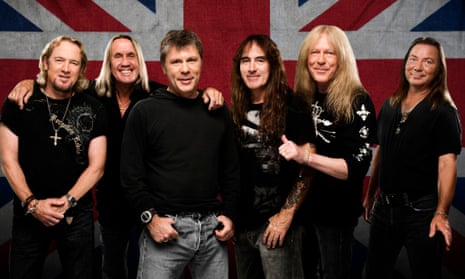There comes a point in almost every august rock legend’s career that you might usefully call the The Acceptance of the Inevitable. It involves a tacit acknowledgment that your rtistic heyday is probably behind you, that your audience ultimately loves you for the music you made 30 or 40 or 50 years ago. Your new album may sell respectably, but it’s never going to dwarf the achievements of your past: fans may still queue up in their hundreds of thousands to buy tickets to see your gigs, but they’re doing so to hear the oldies played live. You have become a heritage artist, a mantle that brings with it certain requirements. You always perform the hits in concert and keep new material to a minimum. The style of your latest album should always nod knowingly towards the most beloved areas of your back catalogue: unfair though it may seem, now is not the time to step outside of your comfort zone, stretch yourself, or indeed unveil your radical new direction, however much you may feel your sixtysomething or seventysomething soul re-energised by the sound of Mumdance and Novelist, or the warped hip-hop of Awful Records. You do not, under any circumstances, try your audience’s patience, lest they opt instead to ignore what you’re doing now altogether in favour of staying at home listening to your old albums.
In theory at least, Iron Maiden should be prime candidates for this pragmatic approach. This Christmas marks 40 years since bass player Steve Harris formed the band; it’s more than 30 years since the albums on which their reputation really rests appeared: The Number of the Beast, Piece of Mind, Powerslave. And yet during the past decade, their albums have become ever more challenging and knotty. If they haven’t exactly confounded their fans with a diversion into glitch-hop, their inclinations towards prog-rock have become more pronounced, their songs lengthier and more epic, a willingness to take risks more noticeable: not many artists who’ve sold 85m records are prepared to release an album without having it mastered because they want a raw sound. Their attitude to their new material, meanwhile, has become ever-more bullish: fans who turned up to their 2006 world tour expecting to hear Run to the Hills and Aces High instead got their most recent album, A Matter of Life and Death, performed in its entirety: when an aggrieved audience member threw a sign reading “PLAY CLASSICS” on stage, frontman Bruce Dickinson ripped it up.
Their 16th studio album continues the trend. The succinct and punchy single Speed of Light turns out to be a decoy. There are other tracks here that point to the band’s roots as leading lights of the new wave of British heavy metal, which instilled a punchy concision into metal – among them Death or Glory and Tears of a Clown, the latter a gloomy meditation on the suicide of Robin Williams – but The Book of Souls lasts more than 90 minutes, and almost half of that time is taken up by three songs. One, the closing Empire of the Clouds, goes on for more than 18 minutes. It is, of all things, a piano-led number written by Dickinson about the crash of the R101 airship during its maiden overseas voyage in 1930. It eventually resolves itself into something that sounds suitably Iron Maidenish – galloping bassline, guitar solos spinning off each other, tricksy changes in tempo – but it takes a long time to do so, and for most of that, it sounds like an orchestrated piano ballad, albeit an orchestrated piano ballad with Dickinson’s patented quasi-operatic tenor over the top. If you hear something in the background, it’s probably denim-clad gentlemen of a certain age and “PLAY CLASSICS” persuasion, clutching at the furniture in order to keep themselves upright.
Said gentleman might be mollified by Harris’s The Red and the Black, which cleaves more to the model of how artists of Iron Maiden’s vintage are supposed to behave: its 14 minutes don’t do anything the band hasn’t already done, and contains a nod to 1983’s The Flight of Icarus. It feels familiar but, crucially, it doesn’t sound like a band coasting, a difficult trick to achieve. There’s a genuine urgency and agility about The Red and the Black and, indeed, almost everything here. As is inevitable on a 92-minute long album, there are a couple of longueurs, not least the lumbering Shadows of the Valley, but for the most part, The Book of Souls is marked by a impressive rawness that scratches against the album’s more grandiloquent moments. The title track’s theatricality never tips in kitschy self-parody. On paper, opener If Eternity Should Fall looks a bit daft and overblown: almost nine minutes long, it features portentous synthesizers, an episodic structure, acoustic interludes and a spoken word coda that begins with Dickinson bellowing “I AM NECROPOLIS!” and gets progressively less subtle and understated from thereoin. But in reality, it rages gleefully and propulsively along.
It’s a bit dewy-eyed and romantic to suggest, as some reviewers have, that the rough spirit of Iron Maiden’s days slogging around London’s pubs still clings to them 85m album sales later, not least because two-thirds of the musicians on The Book of Souls weren’t in Iron Maiden when they were slogging around those pubs. But nor does the album feel like something produced by a group of multi-millionaires on the verge of celebrating their ruby jubilee, cruising towards retirement: on the evidence of The Book of Souls, The Acceptance of the Inevitable isn’t on Iron Maiden’s agenda.

Comments (…)
Sign in or create your Guardian account to join the discussion